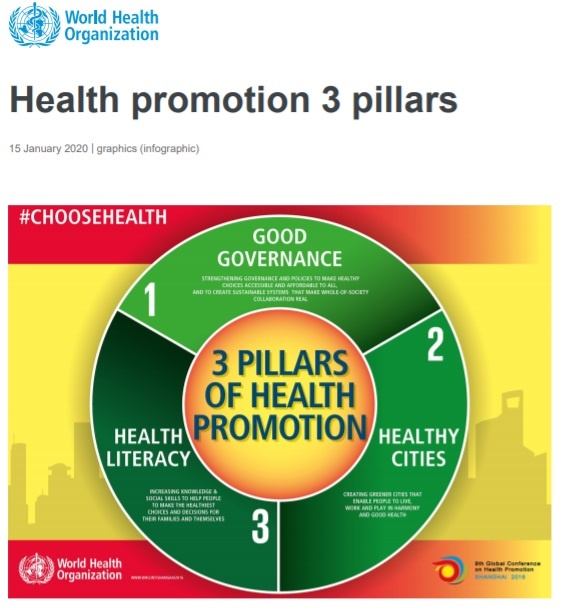A brief history of Health Promotion
The first International Conference on Health Promotion was held in Ottawa in 1986 and was primarily a response to growing expectations for a new public health movement around the world. It launched a series of actions among international organizations, national governments, and local communities to achieve the goal of “Health For All” by the year 2000 and beyond. The basic strategies for health promotion identified in the Ottawa Charter were: advocate (to boost the factors which encourage health), enable (allowing all people to achieve health equity), and mediate (through collaboration across all sectors).
Since then, the WHO Global Health Promotion Conferences have established and developed the global principles and action areas for health promotion. Most recently, the 9th global conference (Shanghai 2016), titled ‘Promoting health in the Sustainable Development Goals: Health for all and all for health’, highlighted the critical links between promoting health and the 2030 Agenda for Sustainable Development. Whilst calling for bold political interventions to accelerate country action on the SDGs, the Shanghai Declaration provides a framework through which governments can utilize the transformational potential of health promotion.
Health promotion is very relevant today. There is a global acceptance that health and social wellbeing are determined by many factors outside the health system which include socioeconomic conditions, patterns of consumption associated with food and communication, demographic patterns, learning environments, family patterns, the cultural and social fabric of societies; sociopolitical and economic changes, including commercialization, trade and global environmental change.
Definition of Health Promotion
Health promotion is defined as a behavioral social science that draws from the biological, environmental, psychological, physical, and medical sciences to promote health and prevent disease, disability, and premature death through education-driven voluntary behavior change activities.
Health promotion is the development of the individual, group, institutional, community, and systemic strategies to improve health knowledge, attitudes, skills, and behavior.
The purpose of health promotion is to positively influence the health behavior of individuals and communities as well as the living and working conditions that influence their health.
Why is health promotion important?
Health promotion improves the health status of individuals, families, communities, states, and the nation.
Health promotion enhances the quality of life for all people.
Health promotion reduces premature deaths.
By focusing on prevention, health promotion reduces the costs (both financial and human) that individuals, employers, families, insurance companies, medical facilities, communities, the state, and the nation would spend on medical treatment.
Where are health educators employed?
In schools, public health educators teach health as a subject, promote and implement Coordinated School Health Programs, including health services, student, staff, and parent health education, and promote healthy school environments and school-community partnerships. At the school district level, they develop education methods and materials; coordinate, promote, and evaluate programs; and write funding proposals.
Working on a college/university campus, health educators are part of a team working to create an environment in which students feel empowered to make healthy choices and create a caring community. They identify needs; advocate and do community organizing; teach whole courses or individual classes; develop mass media campaigns; and train peer educators, counselors, and/or advocates. They address issues related to disease prevention; consumer, environmental, emotional, sexual health; first aid, safety, and disaster preparedness; substance abuse prevention; human growth and development; nutrition and eating issues. They may manage grants and conduct research.
In companies, health educators perform or coordinate employee counseling as well as education services, employee health risk appraisals, and health screenings. They design, promote, lead and/or evaluate programs about weight control, hypertension, nutrition, substance abuse prevention, physical fitness, stress management, and smoking cessation; develop educational materials; and write grants for money to support these projects. They help companies meet occupational health and safety regulations, work with the media, and identify community health resources for employees.
In health care settings, health educators educate patients about medical procedures, operations, services, and therapeutic regimens, create activities and incentives to encourage the use of services by high-risk patients; conduct staff training, and consult with other healthcare providers about behavioral, cultural, or social barriers to health; promote self-care; develop activities to improve patient participation on clinical processes; educate individuals to protect, promote or maintain their health and reduce risky behaviors; make appropriate community-based referrals, and write grants.
In community organizations and government agencies, health educators help a community identify its needs, draw upon its problem-solving abilities and mobilize its resources to develop, promote, implement and evaluate strategies to improve its own health status. Health educators do community organizing and outreach, grant-writing, coalition building, advocacy development, and produce and evaluate mass media health campaigns.







